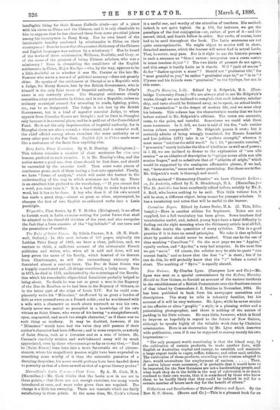The Duke of Saint Simon. By Edwin Canaan, B.A. (B.
H. Black- well, Oxford.)—In this neat volume of 169 pages, originally the Lothian Prize Essay of 1885, we have a clear, jadicious, and, we venture to think, a sufficient account of the aristocratic French politician and writer, who, when all is said and done, will not keep green the name of his family, which beaked of its descent from Charlemagne, as will the extraordinary visionary who flourished almost a century later. The Duo de Saint Simon was a happily constituted and, all things considered, a lucky man. Born in 1675, he died in 1755, undisturbed by the mutterings of the Revolu- tion which his remarkable oligarchical fanaticism probably helped to bring about. No doubt he was not so great a man in the Regency of the Due de Bourbon as he had been in the Regency of Orleans, or
in the latter part of the reign of Louis XIV. But he could com- placently write his " Memoires," unaffected by as great a burden of
debt as ever pressed even on a French noble ; and he was blessed with
a wife with a character as much above reproach as was his own. Sorely never was mortal so panoplied in a knowledge of his own virtues as Saint Simon, who wrote of his having "a straightforward, open, unguarded, and much too simple character," as if there was no such thing as modesty. It may be doubted, however, if his " Memoires " would have had the value they still possess if their author's character had been different ; and in some respects, as a study of Saint Simon, both as a historian and as a man of letters, Mr.
Cannan's carefully written and well-balanced essay will be much appreciated, even by those who cannot go so far as to say that.,—" Had he [Saint Simon] been born into a more favourable set of circum- stances, where his magnificent passion might have been expended on something more worthy of it than the miserable parasites of a decaying despotism, his name would perhaps have been handed down to posterity as that of a hero as well as that of a great literary genius."


































 Previous page
Previous page